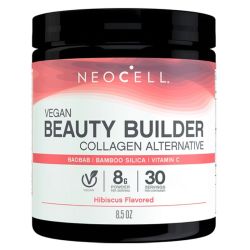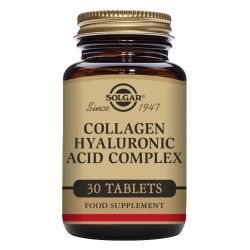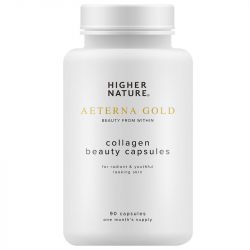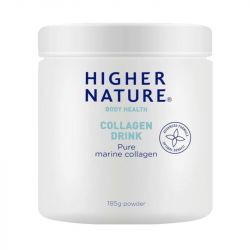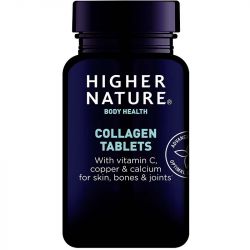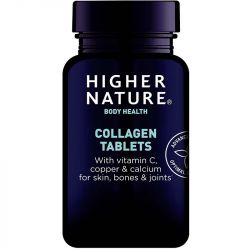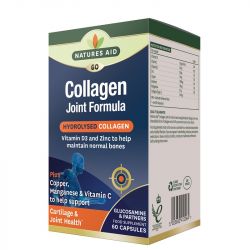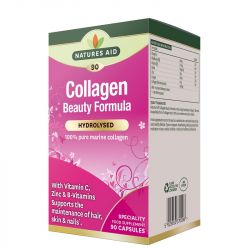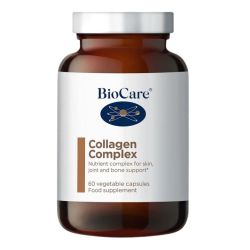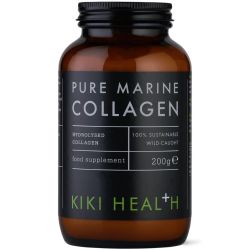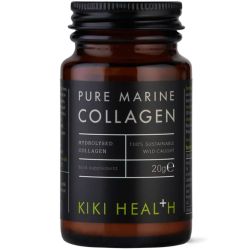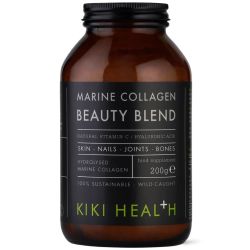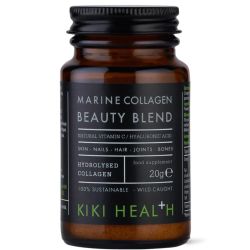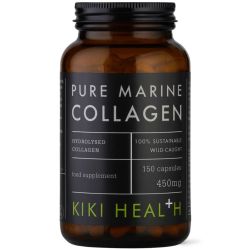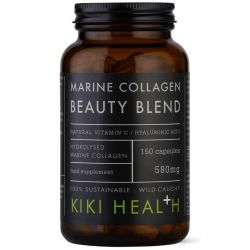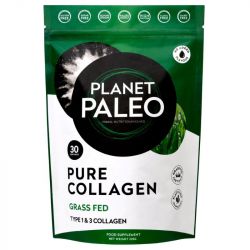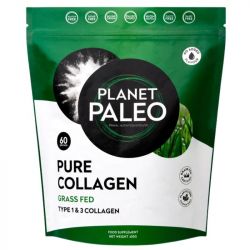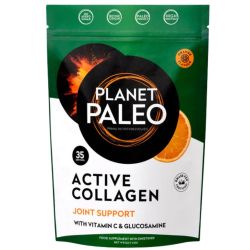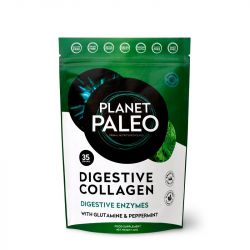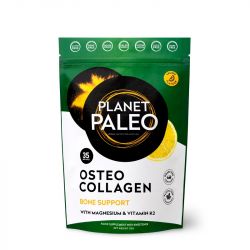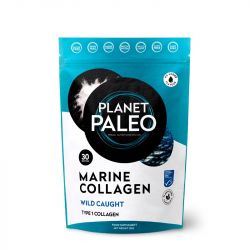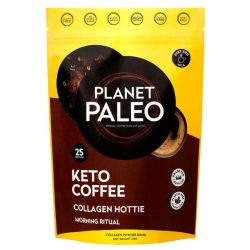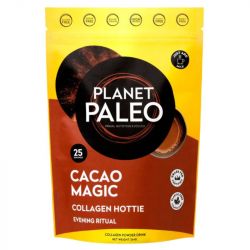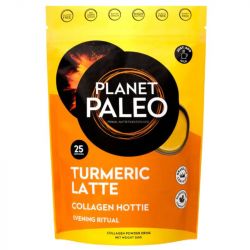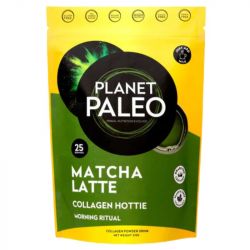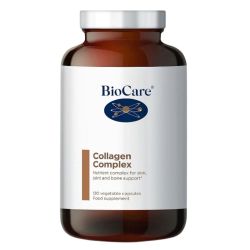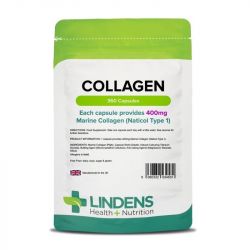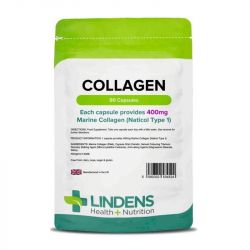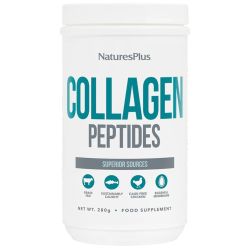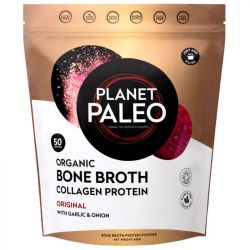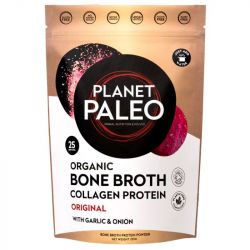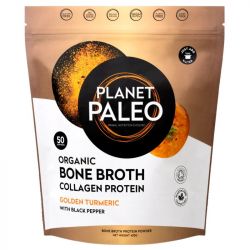Collagen Supplements
Collagen, a vital protein naturally produced by the body, is essential for maintaining healthy muscles, bones, skin, and connective tissues. It supports joint flexibility and skin elasticity, but as collagen levels decline with age, this can lead to joint pain and visible signs of ageing like wrinkles.
Types of Collagen:
Marine Collagen: Sourced from fish skin, it's renowned for its benefits to skin health, with studies suggesting it may be more effective than bovine collagen for promoting elasticity and reducing wrinkles.
Beef Collagen: Derived from cow skin, cartilage, and tissue, it is highly effective for joint support and overall connective tissue health.
Vegan Collagen: Is a collagen alternative made by fermenting yeast or bacteria and combining it with amino acids to mimic the structure and benefits of animal-derived collagen.
Read more: Everything you need to know about Collagen: Benefits, Uses, Dosage, FAQ's
- Planet Paleo Organic Bone Broth Collagen Protein Original 450gSpecial Price £41.64 Regular Price £48.99
- Planet Paleo Organic Bone Broth Collagen Protein Original 225gSpecial Price £25.49 Regular Price £29.99
- Planet Paleo Organic Bone Broth Collagen Protein Golden Turmeric 450gSpecial Price £41.64 Regular Price £48.99
All you need to know about Collagen
WHAT DOES COLLAGEN DO?
Providing your body with collagen allows the connective tissues in your body to abosorb it and as a result because more elastic.
For joints this is useful because it means that the joints are more capabale of movement and thus it can help to ease discomfort associated with joint pain.
For the skin improving the elasticity of skin means it appears more supple and soft. As skin loses its elasticity and hydration this tends to bring on the signs of ageing (such as wrinkles, fine lines and sagging).
HOW MUCH COLLAGEN SHOULD I TAKE PER DAY?
Research has shown that humans can safely consume anything between 1 and 15 grams per day.
Research has also shown that a dose of at least 5000mg (5g) is needed daily to have an impact when supplementing with collagen. Read More: Collagen Dosage & Best Practises
SHOULD I TAKE A COLLAGEN POWDER OR TABLET?
Collagen powder is recommended over tablets and capsules for several key reasons. Unlike capsules or tablets, which often contain only 500mg of collagen—an ineffective dose unless taken in large, costly quantities—powdered collagen delivers higher, more effective amounts. It’s versatile, easily mixed into hot or cold drinks without losing its benefits, and often includes added ingredients like Vitamin C and Hyaluronic Acid. These additions support younger-looking skin, slow the ageing process, and improve joint mobility and flexibility, making collagen powder a more effective and convenient choice. Read more: Benefits of taking Collagen with Vitamin C
HOW LONG DO COLLAGEN SUPPLEMENTS TAKE TO WORK?
Collagen supplements typically start showing results within 8 weeks, though this can vary based on the target area. Skin improvements, such as increased elasticity and reduced wrinkles, are often noticeable sooner, while benefits for joint health and flexibility—especially for conditions like arthritis—may require consistent use for at least 3 months. Regular daily intake is key to achieving the best results for both skin and joint support.
WHAT IS HYDROLYSED COLLAGEN?
Hydrolysed collagen, also known as collagen peptides, is collagen broken down through hydrolysis, a process that reduces it into smaller, easily absorbed molecules. This form is commonly used in supplements due to its high bioavailability, enhancing the body’s ability to absorb and benefit from it. Additionally, hydrolysed collagen is tasteless, dissolves effortlessly in liquids, and is ideal for adding to both hot and cold drinks.
CAN I OBTAIN COLLAGEN NATURALLY THROUGH FOOD?
Yes, foods like fish (with skin), poultry, beef, eggs, and dairy naturally provide collagen. However, these sources contain complex collagen, which the body must break down before absorption—a process that is less efficient. Collagen supplements, on the other hand, provide hydrolysed collagen, which is pre-broken down for optimal absorption, delivering more effective results than relying on food sources alone.

